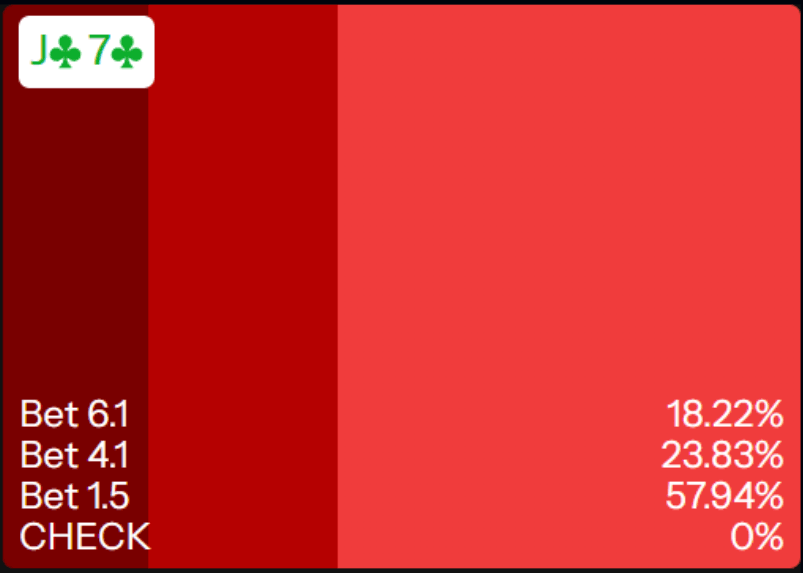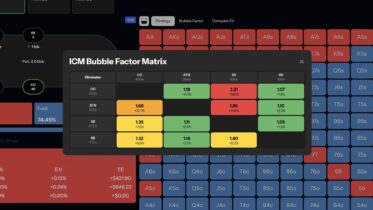
Where does the data come from in PeakGTO?
All of the data is solved with the best solvers on the market by top professional poker players. Preflop data comes from Holdem Resource Calculator solves or Monkersolver. The postflop data is fully solved in PioSolver, using CFR-based modeling to create unexploitable GTO strategies.
To what exploitability is the data solved to?
Holdem Resource Calculator (HRC) data is solved below CI = 5, and ICM data is solved below CI = 2. PioSolver’s data exploitability falls between 0.25% and 0.5%, depending on the size of the tree. The shallower SPR spots are consistently solved to 0.25% exploitability.
What preflop and postflop charts are included in the database?
The preflop database includes the following preflop charts for all spots at a given stack depth:
Live & Online 8-Max MTT’s: 100bb, 80bb, 60bb, 40bb, 30bb, 25bb, 20bb, 15bb, 12bb, 10bb, 9bb, 8bb, 7bb, 6bb, 5bb, 4bb, 3bb, 2bb
Live Cash Games: 200bb, 100bb
The postflop database includes the following libraries:
Live & Online 8-Max MTT’s: 80bb, 60bb, 40bb, 30bb, 25bb, 20bb, 15bb, 12bb, 10bb
Live Cash Games: 100bb
To learn about the data coming soon to PeakGTO, check out our roadmap at pokercoaching.com/blog/peakgto-roadmap
What is the best way to use the PeakGTO Library to study my game?
Your overall goal should be to focus on the big picture rather than memorize every action for every hand. Try to understand the overall strategy, global frequencies, and patterns that come up across different spots. The goal is to train yourself to ‘become the solver’ rather than to use the solver as a look‑up tool to stroke your own ego. Trying to memorize every spot is futile and will leave you frustrated; instead, focus on the big picture and the common mechanics at play.
GTO outputs are simply a baseline, assuming your opponent also plays perfectly under the given assumptions. ‘Becoming the solver’ will allow you to adjust much quicker to take advantage of your opponents’ mistakes and become a great poker player.
What are ‘Action Frequencies’ in the library?
The action frequencies show how often each action occurs at a given location. When you look at your overall range, these are often called ‘global frequencies’ and show how often your range as a whole should take a given action.
When you look at a specific combo, this output also shows its action frequency. This combo of Jc7c should bet 6.1bb 18.22% of the time, bet 4.1bb 23.83% of the time, bet 1.5bb 57.94% of the time, and check 0% of the time.

Why do combos mix between multiple options? Shouldn’t there be a best option?
Combos will mix frequencies when the expected values of the mixing options are sufficiently similar that both should be taken at some frequency.
Just because it’s mixing doesn’t mean you should approach it as ‘do whatever you want’; otherwise, your strategy becomes exploitable. When reviewing hands, you want to start with your global frequency of actions, looking at how much your overall range takes an action, then look to your combo to see what the highest EV play(s) for that combo are within your range.

What are the suit selector & Equity/EV buttons used for?
The suit selector lets you sort the data by suit, analyzing how each suit plays in any spot you choose. This can help you identify how to play your flush draws or flush draw blockers in certain spots.
Equity is the measure of the likelihood that you are to win the pot if the rest of the action is checked down. This button shows the overall range equity for the Out-of-Position or In-Position player. This data is used to determine Range Advantage, a key mechanic for different strategies. One thing that you will commonly see is that when you have a large range advantage (meaning your equity is over 55%), you will be very aggressive in that spot with your betting frequency.
EV buttons show your expected value for your range, or how much of the pot you will win on average with your entire range. This number is in units of big blinds and is related to equity, but it also accounts for future actions—bets, raises, calls, and folds — to calculate your pot share in the hand. Let’s say that your equity is 50% and the pot is 6.1bb. If you were forced to check the pot down, your EV would be 3.05bb.
Given future actions, though, your EV may be 2.7bb or 3.5bb, depending on factors like position, range composition, board texture, etc. When your EV is higher than your equity % (in bbs), that means you will over-realize your equity, likely due to being in position, having a range, or a nut advantage. When your EV is lower than your equity % (in bbs), that means you will under-realize your equity, likely due to being out of position, having a range disadvantage, or a nut advantage.

What is EV-Loss (EVloss/100) and what does it mean?
EV-loss is a measurement that compares your answer to the GTO answer. If you play the spot perfectly, choosing the best answer, your EV-loss will be 0, as it’s comparing your answers to what the computer would do. When you make an incorrect answer, you can measure it using EV-loss for how much the decision loses. For example, if you make an error with an EV loss of 0.05bbs, it is a small mistake and means that, if the blinds are 500/1000 – 1000 in an MTT, your error would cost you, on average, 50 chips. Larger mistakes will yield larger EV-loss. In a large pot, a big mistake could yield an EV-loss of 5bbs (or 5000 chips in the 500/1000 – 1000 level).
EV loss/100 standardizes your mistake over 100 hands. It just multiplies the EV loss from 1 decision by 100 to show your EV loss over 100 hands. If you make a mistake worth -0.1bb, it would be -10bb/100 hands, showing that it can cost you over the long run.
What is the PeakGTO ELO Score, and how does it work?
The ELO score is a measure of the EV loss you are taking in the trainer. The higher the EV‑loss, the further away from GTO poker you are playing, which will drop your ELO score. As your EV‑loss approaches 0, due to choosing the best options, your ELO score will improve.
To learn more in-depth about how ELO is calculated, and what the rankings are, check out pokercoaching.com/blog/peakgto-poker-elo-score/
Can I use PeakGTO during live or online games?
Absolutely not. Using PeakGTO during live or online games is strictly prohibited and unethical in any situation. Online poker sites and live casinos have clear rules against the use of real-time assistance (RTA) tools, including GTO apps, while playing. Violating these rules can lead to severe consequences, including account suspension, fund forfeiture, or permanent bans. PeakGTO is a study tool and should only be used as a study tool.
Is PeakGTO suitable for all poker variants (e.g., Texas Hold’em, Omaha)?
At this time, PeakGTO is a database of No‑Limit Texas Hold‘em strategies, not other games.




